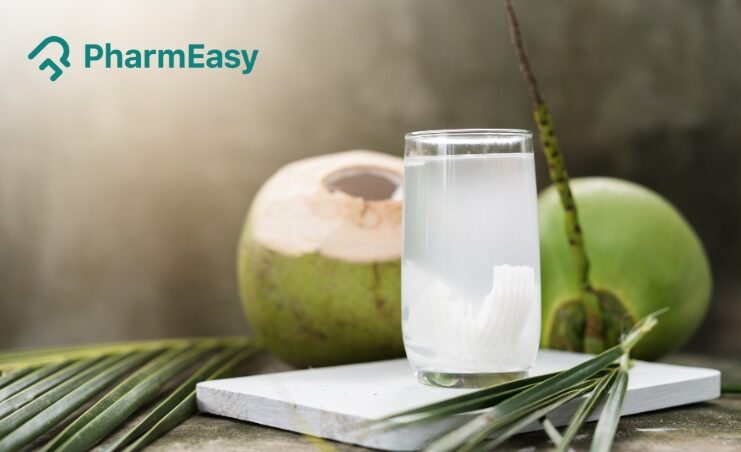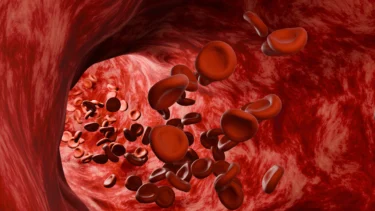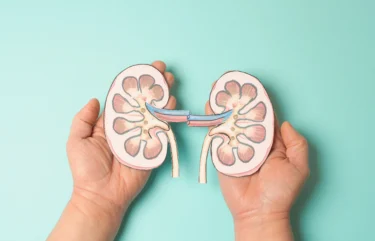Is Coconut Water Good for Diabetes? A Fact-Based Discussion
By Dr Rajeev Singh +2 more

Get,

to manage your symptom
Get your,


4 Cr+ families
benefitted

OTP sent to 9988776655



You’ve successfully subscribed to receive
doctor-approved tips on
Whatsapp

Get ready to feel your best.

Hi There,
Download the PharmEasy App now!!


Register to Avail the Offer
Send OTPBy continuing, you agree with our Privacy Policy and Terms and Conditions

Hi There,
Sign up on PharmEasy now!!
Trusted by 4 crore+ families

OTP sent to 9988776655



You have unlocked 25% off on medicines




Code: NU25
By Dr Rajeev Singh +2 more
Table of Contents
Millions across the globe suffer from diabetes. This health issue calls for a life change, mainly in the diet. A large proprotion of packaged drinks available in the market are either full of sugar or contain artificial sweeteners which may be harmful for health. The hunt for natural drink swaps aiding blood sugar control is thus continual and coconut water seems to be a standout1.
This blog aims to shed light on the potential health benefits of coconut water and its role in diabetes. We will dive into its nutrient profile, its effect on blood sugar, and how to safely add it to your diet.

Coconut water is a health-packed drink from the core of young, green coconuts. This section explains what makes it special, its nutrient content, and why it’s good for you11.
A cup (240 ml) of raw coconut water gives you:
Sweetened versions have more sugar. So, plain coconut water is a better pick1.
Our bodies need vital minerals called electrolytes. They keep our body fluids balanced. Coconut water is rich in them, providing a good part of your daily needs in just one cup8.
Coconut water can help you manage weight while staying hydrated. Plus, it adds a sweet twist to your water intake1.
Nature has packed coconut water with antioxidants. These substances fight harmful free radicals, which makes it a good choice to drink4.
Diabetes is a condition that leads to high blood sugar levels in the blood due to insulin-related issues. There are two key types of the disease:
Signs of diabetes can be unquenchable thirst, passing urine often, sudden weight loss, tiredness, and blurry vision. Managing health and lifestyle changes are key in handling diabetes.
We’ll explore in this section how does coconut water falls into diabetes control, looking at how it can be a good addition to a diabetes-friendly meal plan10.
Consumed wisely, coconut water is said to be helpful for diabetics. This section dives into some likely plus points.

Diabetes often worsens blood flow. Having coconut water may help in widening blood vessels, helping better circulation2. But further research is needed to prove this.

Coconut water makes weight management easier. It’s a low-calorie drink packed with nutrients. This can help keep weight in check and health on track1.

Regular coconut water consumption might be good for kidney health . Research hints that it lowers kidney damage caused by diabetes, although more long-term studies are needed to prove this3.

Coconut water can prove to be a heart-friendly choice. It’s rich in nutrients like potassium9 and magnesium which are good for heart5,7. More research is required to confirm this benefit.
As coconut water has natural sugars, people with diabetes might be concerned. Drawing a line between natural and added sugars can bring clarity.
The sugar found in whole foods is natural. Added sugar is what food processors add to food items and drinks. In coconut water, the sugar is natural. That’s ok if you don’t overconsume it1.
Put next to other drinks, coconut water seems much better. It boasts less carbohydrates and sugar than most sugary drinks, potentially making it a safer pick1.
While coconut water may offer perks for diabetics, they must tread carefully. Below are a few things to remember before adding it to your routine.
Also Read: 10 Best Carbohydrates To Help Manage Blood Sugar!
Knowing when and how to have coconut water can help you get the most out of it. Let’s look at some strategies:
Also Read: Juice for Diabetics: What Research Says About Blood Sugar and Beverages
When consumed wisely, coconut water may have potential perks for diabetics. Its nutrient-rich, low calorie, and electrolyte-packed profile makes it a worthy swap for sugary drinks. As always, talk to your doctor before you introduce anything new to diet, keep a check on blood sugar levels, and eat balanced meals for the best diabetes control.
Also Read: Diabetes: The Silent Killer Sweeping Across India
Stick to 8 ounces or less of raw coconut water daily. However, it’s advisable to discuss with your healthcare provider first if you have diabetes.
People with high potassium levels, kidney problems or those taking antibiotics should always check with a healthcare professional before having coconut water.
While raw coconut water has natural sugars, it still trumps most sugary drinks. Always choose plain and unsweetened varieties to cut down on sugar intake.
For diabetics, plain coconut water, herbal teas, and water infused with fresh fruit or cucumber slices are smart picks. But if are a diabetic, its best to discuss with your doctor before you introduce anything new to diet.
Plain, unsweetened coconut water wins over other types. Always read labels and aim for pure, natural options.
Disclaimer: The information provided here is for educational/awareness purposes only and is not intended to be a substitute for medical treatment by a healthcare professional and should not be relied upon to diagnose or treat any medical condition. The reader should consult a registered medical practitioner to determine the appropriateness of the information and before consuming any medication. PharmEasy does not provide any guarantee or warranty (express or implied) regarding the accuracy, adequacy, completeness, legality, reliability or usefulness of the information; and disclaims any liability arising thereof.
Links and product recommendations in the informationprovided here are advertisements of third-party products available on the website. PharmEasy does not make any representation on the accuracy or suitability of such products/services. Advertisements do not influence the editorial decisions or content. The information in this blog is subject to change without notice. The authors and administrators reserve the right to modify, add, or remove content without notification. It is your responsibility to review this disclaimer regularly for any changes.
Comments

Leave your comment...
You may also like
Comments